
JOIN US
GET OUR KUNEKUNE
NEWSLETTER
New and highly discounted products, fresh and hot stories & useful information
Registered KuneKunes
Looking for Registered KuneKune pigs?
Are you looking to buy a registered KuneKune? This guide will help you navigate the process of purchasing IKKPS Registered KuneKunes and avoid costly mistakes. We will also discuss all the many reasons you should buy registered KuneKunes. Please take a few moments to carefully read this guide and how the IKKPS Registration Guarantee works before you purchase a new registered KuneKune pig or KuneKune piglets. Learn about responsible ownership and why registering KuneKune pigs helps the breed.
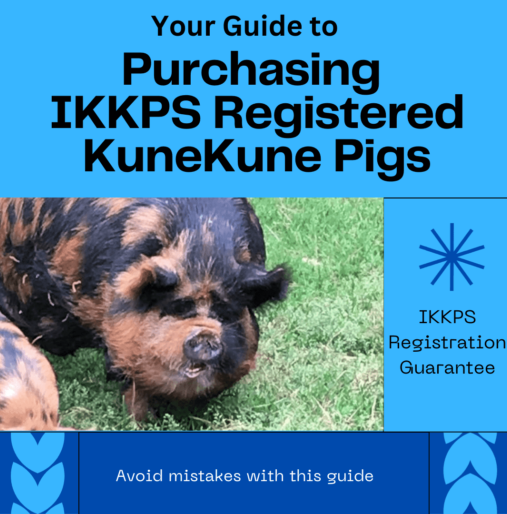
Quick links to sections of this page or related articles
A BUYER’S GUIDE TO PURCHASING A REGISTERED KUNEKUNE
So you are considering buying registered KuneKunes? You are in the right place for information that may help you make the right choice. We will discuss all the advantages of purchasing registered KuneKunes or unregistered KuneKune pigs. Giving you the information that you need to make the best choice for your breeding program.
This guide covers purchasing the litter-notified pig and piglets, the bred sow, and the purchase of already fully registered pigs. If you are looking to buy a registered KuneKune this information will be very helpful.
Tips
- When purchasing an IKKPS registered pig you do not have to be a member of IKKPS, although it is suggested. Regardless of membership, IKKPS will assist you with ensuring your pig is registered if purchased from an IKKPS member.
- Verify that the Breeder or Seller is a current IKKPS member. The IKKPS guarantee is only applicable to members. Breeder's List
- Email us to ask if they were a former member. If they were a member at the time the pig was born, the guarantee will still apply. IKKPS will have access to all former members as well in our records.
- Get an IKKPS Sales Contract stating that the pig is being sold IKKPS registered and contains all pertinent information about the pig. An IKKPS Sales Contract will show the logo in the left header section of the Sales Contract. Ensure that the registered KuneKune is marked as a Grazing Pig (no breeding rights) or as a breeding pig (full breeding rights) for whichever you are purchasing. This is important if you want to breed.
- Please note when you have an IKKPS sales contract, IKKPS guarantees registration provided the DNA matches the parents. IKKPS will also cover the charge of registration of that registered KuneKune at no charge to you. You will only be responsible for the permanent identification and DNA if not already completed.
Why Should You Buy Registered KuneKunes
Purchasing an animal, whether it be a dog, cat, horse, KuneKune pig, or any other creature, is a significant decision that requires careful consideration. One essential aspect often overlooked is the importance of buying registered animals. Registering an animal serves multiple purposes, providing numerous benefits to both the owner and the animal itself. In this article, we will explore the reasons why purchasing registered animals is a wise choice.
Buying a registered KuneKune comes with numerous benefits. Whether you are a farmer looking to improve your livestock, a pig owner seeking purebred grazing pigs, or even a homesteading pig, choosing registered KuneKunes offers many advantages. These pigshave gone through a thorough registration process that ensures their lineage, breed standards, and overall quality.
Guarantees Authenticity and Heritage
When you purchase a registered KuneKune pig, you can be sure that it is authentic and has a verified lineage. The registration papers provide information about the animal's breed, bloodline, and genetic history, which is especially important if you are interested in specific breeds or plan to breed your pigs. Registered animals have documented proof of their purebred status, ensuring their authenticity and preserving their genetic heritage. On the other hand, purchasing unregistered pigs that look like KuneKune pigs may not have the same unique qualities as the actual breed. Therefore, it is always recommended to opt for registered KuneKune pigs to ensure that you get what you paid for.
In addition to lineage, and conformation, purchasing registered KuneKune pigs ensures breed conformity and adherence to recognized breed standards. When animals are registered, they have met specific criteria set by breed associations or organizations. For KuneKunes, DNA has been checked against the parents to ensure that the ancestors are correct. By adhering to breed standards, registered animals maintain the essence and distinctive characteristics of their breed. This is especially important for breeders aiming to preserve rare or endangered breeds, contributing to their conservation efforts, and safeguarding genetic diversity.
What Happens with Unregistered KuneKune Pigs
When you do purchase unregistered KuneKune pigs, you may not get their sweet, docile, easygoing temperament. You may experience difficulty in selling the offspring as well. Your cost to raise the litter of KuneKune piglets will be the same as if you have registered KuneKune piglets. However, your pricing will be very different. You may get $50-200 per piglet unregistered. However, a registered KuneKune will sell for $450-750 on average. So, why would you want a lesser profit with the same cost involved? It does not make much sense right?
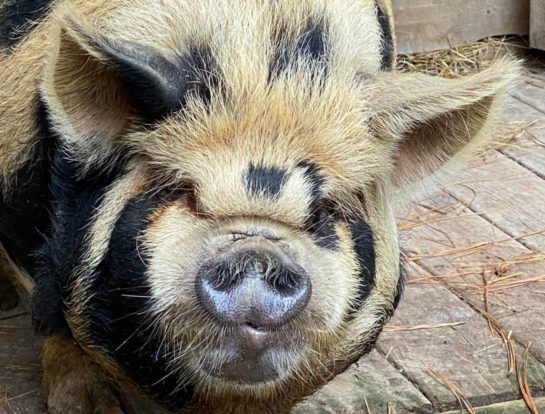
Registered KuneKunes look like KuneKune pigs
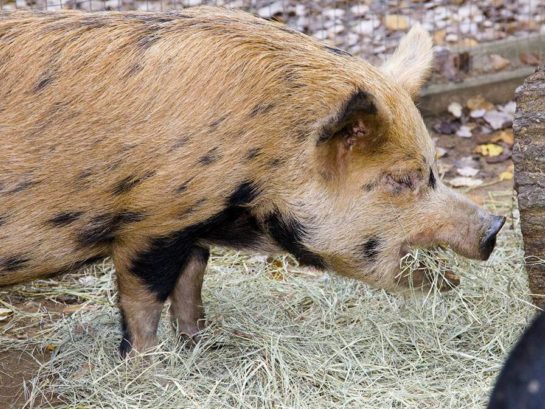
Unregistered KuneKunes have questionable heritage. Could be mixed.
Enhances Future Breeding Opportunities
For individuals who are passionate about animal breeding, purchasing a registered KuneKune pig can offer a range of exciting possibilities. Some registered KuneKunes come with breeding rights, enabling their owners to participate in carefully planned breeding programs and make a positive impact on the breed's population. Breeding registered KuneKune pigs provides the opportunity to produce offspring with DNA-verified pedigrees, ensuring the continuation of desirable traits within the breed and contributing to its overall improvement.
Access to Supportive Networks
Registered animals often come with registration certificates from specific breed clubs or associations. These organizations provide a valuable network of fellow owners and breed enthusiasts who can offer advice, support, and resources. Engaging within these networks can be incredibly helpful for new pig owners seeking guidance and assistance throughout their journey. Additionally, these networks often organize events, shows, and competitions, allowing pig owners to showcase their registered pigs and learn more about their breeds.
Another valuable benefit of buying registered KuneKunes is access to valuable breed and breeding information. Many breed associations and registries offer
extensive resources, including breeding guides, educational materials, and networking opportunities. These resources can contribute to the success of breeding programs by providing knowledge on mating strategies, genetic selection, and breed-specific management practices. Additionally, registered pig owners gain access to a community of like-minded individuals who share a passion for the breed, mentoring, learning, support, and collaboration.
How IKKPS Helps Networking Opportunities
IKKPS offers networking opportunities every month in the way of Virtual Meetings. Each month is a different topic to help KuneKune breeders be successful by providing valuable information and education. Not only do you gain knowledge from the host of the meeting but, with IKKPS, everyone shares and interacts in the meetings. So, you are building valuable connections in the KuneKune community. You may find the right breeder to make your next purchase from. Likewise, you may get your next sale from a breeder who remembered you were located somewhere a potential buyer is located. The possibilities are endless when you find those connections within the community.
Assures Health and Quality
This is an important reason to buy registered KuneKunes. Breeders who register their KuneKunes usually adhere to specific breed standards, ensuring that only healthy and high-quality KuneKunes are eligible for registration. When a breeder is willing to put their name as the breeder on a registration certificate it should mean that they are proud of this offspring.
Buying a registered animal reduces the risk of obtaining pigs with underlying health issues or substandard qualities. This is not a guarantee but, with the registries trying to educate breeders on the standards and culling practices, it is usually the case. It provides reassurance that the animal has been responsibly bred and is likely to lead a healthy life.
Promotes Responsible Breeding
These pigs are carefully selected for their desirable traits such as friendly temperament, small size, and unique color patterns. Breeders work to maintain the purity of the KuneKune breed by keeping detailed records and adhering to strict breeding standards. This ensures that each registered KuneKune pig meets the breed's specific criteria and contributes to the overall health and quality of the breed. By carefully managing the breeding process, breeders can produce KuneKune pigs that are not only visually stunning but also have the friendly and docile nature that the breed is known for.
When breeders get into the breed, they carefully select their KuneKune herd and plan their breedings out usually well in advance. They take the time to educate themselves on the best possible breeding program they can while maintaining the health of their herd and breeding program.
Breeders who make the effort to register their pigs demonstrate a commitment to their breeding programs, and they strive to improve the breed's overall quality. By purchasing registered KuneKunes, buyers support these responsible breeders, encouraging ethical practices and maintaining breed standards. This, in turn, helps prevent the proliferation of backyard breeding operations or trendy yet unhealthy crosses that can compromise the health and welfare of future generations of the breed of KuneKune pigs.
Stop Helping the decline of your beloved breed
When you purchase unregistered breeding stock, you contribute to the decline of the breed, making it less likely for future generations to enjoy. Over time, mixing other breeds of swine with KuneKune pigs will cause them to lose the many qualities that we cherish in the breed. KuneKune pigs are known for their docility, ease of handling, and distinctive characteristics, but without proper care and good breeding practices, we may lose the breed altogether.
People often claim that there is no market for registered KuneKune pigs in certain areas. However, the market would exist if unregistered pigs were not being sold. The sale of unregistered KuneKune pigs can harm the breed overall. It is also important to consider how you market your pigs. Do you promote them on social media, have a website, or advertise them? Does your KuneKune registry assist you in advertising your pigs for sale and promoting them on social media? Are you taking high-quality photos of your pigs to attract new buyers?
Market Value
Registered animals generally have a higher market value compared to unregistered counterparts. Their documented lineage, adherence to breed standards, and assurance of DNA testing significantly increase their desirability and value. Owners of registered KuneKunes have an opportunity to participate in shows, competitions, and auctions where the demand for quality registered KuneKunes is high. This can result in better financial returns for farmers or breeders, making it a worthwhile investment.
Buying a registered KuneKune is the way to go. Your investment may be less by purchasing unregistered but, your cost will be the same. Meaning your unregistered KuneKunes will cost the same as raising registered KuneKunes and your return on investment will be but a fraction of what registered KuneKunes are worth.
Summary
Purchasing registered KuneKunes offers numerous advantages for both the KuneKune owner and the pigs themselves. From knowing their authentic heritage and lineage to ensuring breed characteristics, registered pigs provide a solid foundation for responsible pig ownership and breeding programs. Furthermore, supporting responsible breeders by purchasing registered KuneKunes promotes ethical breeding practices and enables the continuation of healthy and well-preserved breeds. Investing in registered KuneKune pigs not only brings personal satisfaction and enjoyment but also contributes to the overall welfare and future prosperity of the KuneKune pig community.
What to look for in Purchasing a Litter Notified Pig
- Check the IKKPS HERD BOOK to verify that a Litter Notification has been recorded for the pig you are purchasing. On the right side of the pigs record you will see the words “pending registration”. That means this pig was litter notified and not yet registered. What is needed to finish the registration is DNA proof of parentage and permanent identification.
- Be leery of purchasing a pig that is not yet litter notified as the IKKPS guarantee will not apply if a litter notification has not been completed by the breeder.
- Verify that the Breeder of the pig in the IKKPS Herd Book is the person that you are purchasing the pig from. Ensure that person is the same person that is signing the Sales Contract.
- Look up the IKKPS registration number of the pig you are purchasing. Check in the IKKPS herd book to see that the registration number is for the pig you are purchasing. You can also ask for a copy of the Litter Record. The Litter Record is a nice document that will show the ancestors, COI, AVK and litter information of the entire litter. You will also see pictures of the parents on the litter record provided they have pictures entered.
- It is important to ensure that the breeder will do the registration process for you as in IKKPS only the breeder can register the pigs they breed. If they say that you can register the piglet yourself, please note only the breeder can do it for you. The exception is our IKKPS guarantee of registration. We will attempt to work with the breeder first to get the pig registered and if they are unable to do so, with a signed IKKPS Sales Contract, the IKKPS will do it.
Purchasing a KuneKune Pig that is already fully Registered.
- Check the IKKPS Herd Book to verify that the pig is fully registered with IKKPS. A fully registered pig will have the label on the right side of the pig’s record in the herd book saying breeding pig. In the DNA section, you will see a DNA case number. The DNA case number will start with IKP, AKB, or KPS. A Grazing Pig registration will show a “Grazing Pig” label and the DNA, section will have the words “Grazing Pig”. Grazing pigs are sold with no breeding rights. Breeding pig labels means they can produce and have their offspring registered.
- Using the IKKPS Herd Book make sure that the registered owner is the person that you are purchasing this pig from. This is the person your Sales Contract should be signed by.
- Decide with the Seller, who is submitting the Transfer of Ownership and have this included in the contract. In IKKPS, the registered owner or the new owner can do the transfer of ownership. The new owner does not have to be a member of IKKPS to enter the transfer of ownership. However, it costs more for a non-member to do the transfer.
Buying a Grazing Pig Being Sold with Breeding Rights
- If you are purchasing a Grazing Pig registered pig and expect Breeding right registration, it is important to note that only the breeder can change this grazing pig registration to a breeding pig registration.
- Make sure it is clear in the Sales Contract the breeder will change the registration over to breeding rights. They do this by having a DNA proof of parentage completed and entering a new piglet registration form.
- In the event the breeder fails to do the piglet registration to convert the grazing pig registration to a breeding pig registration, the guarantee will be eligible if it is notated on the IKKPS Sales Contract. The statement should say “this pig will have breeding rights”. While IKKPS will cover the cost of the registration, you, the new owner, would have to complete the DNA. The guarantee will apply if the DNA proof of parentage matches the parents and/or the parent denoted on the DNA is IKKPS registered. If the parent is not IKKPS registered, IKKPS will attempt to get permission to Dual register the parent, and IKKPS will cover the registration cost for you.
Considering a Bred Sow
- Check the IKKPS Herd Book to verify that the pig is fully registered with IKKPS. A fully registered pig will have the label on the right side of the animal’s record in the herd book saying breeding pig. In the DNA section, you will see a DNA case number. The DNA case number will start with IKP, AKB, NCS, or KPS. A Grazing Pig registration will show a “Grazing Pig” label and the DNA, section will have the words “Grazing Pig”. Grazing pigs are sold with no breeding rights. Breeding pig labels means they can produce and have their offspring registered.
- Using the IKKPS Herd Book make sure that the registered owner is the person that you are purchasing this pig from. This is the person your Sales Contract should be signed by.
- Decide with the Seller, who is submitting the Transfer of Ownership and have this included in the contract. In IKKPS, the registered owner or the new owner can do the transfer of ownership. The new owner does not have to be a member of IKKPS to enter the transfer of ownership. However, it costs more for a non-member to do the transfer.
- Verify using the IKKPS Herd Book that the potential sire(s) are IKKPS registered as well. Make sure the sales contract has the sire information on it.
- In the event the sire is not registered with IKKPS, and the seller fails to do the dual registration, IKKPS will ask for permission from the owner to register the sire with IKKPS and will cover the dual registration cost for you.
In Conclusion
If you are purchasing an IKKPS registered pig it is a straightforward process but, this guide is meant to help you, the purchaser, have everything you need for registrations to be guaranteed. You will find that IKKPS is a great resource to give you that added layer of buyer protection and help you avoid making costly mistakes in purchasing an IKKPS Registered KuneKune pig.
IKKPS is here to serve both our KuneKune Breeders and the new owners of IKKPS Registered KuneKunes. You will find us more than willing to help you should you need assistance regardless of membership. So please, do not hesitate to reach out to us if you have any questions or concerns.
Registered KuneKune Pigs Versus Unregistered KuneKunes: Things to consider
KuneKune pigs are an increasingly popular breed of pig, known for their friendly nature and excellent foraging abilities. As the demand for KuneKune pigs continues to rise, potential buyers are faced with the decision of whether to purchase a registered or unregistered KuneKune pig. While both options have their own set of advantages and disadvantages, there are several key factors that potential buyers should consider when making this decision.
Primarily, it is important to understand the differences between registered and unregistered KuneKune pigs. Registered pigs are those that have been officially recognized, DNA verified, and documented by a breed association, such as the International KuneKune Pig Society (IKKPS) in the United States. On the other hand, unregistered pigs do not have any official documentation or pedigree. So, the ancestors are lost as well as the bloodlines.
Breed Purity
One of the main benefits of buying a registered KuneKune pig is the assurance of its breed purity and lineage. Registered pigs have documented pedigrees, which means that buyers can trace the ancestry and genetic history of the pig. This can be crucial for individuals who are looking to breed KuneKune pigs, as it allows them to make informed decisions about genetic diversity and bloodline quality. Additionally, registered pigs often come with breed standards and guidelines, which can be helpful for new owners who may not be familiar with the breed.
KuneKune Pig Shows
Another advantage of purchasing a registered KuneKune pig is the potential for showing and competing in breed exhibitions. Many IKKPS-registered pigs are eligible to participate in shows and competitions, which can be a rewarding experience for both the pig and its owner. Show competitions can also help to promote and preserve the breed standards, as well as foster a sense of community among KuneKune enthusiasts. Winning titles can help your breeding programs by showing off the quality of your KuneKune pigs. This can result in an increase in piglet sales for your farm.
Prices
On the other hand, unregistered KuneKune pigs may be a more affordable option for individuals who are simply looking for a pet or a pig for pork purposes. These pigs may not meet the strict breed standards set by the IKKPS, but they can still exhibit the friendly and gentle nature that KuneKune pigs are known for. However, without knowing it is truly a KuneKune pig that is backed by certified pedigrees, what you get will be unknown.
Therefore, you may pay less upfront but what do you have? A docile, sweet-natured pig who will produce piglets with KuneKune characteristics or piglet surprises that look like a pot belly pig or some other breed of swine. The saying you get what you pay for means exactly what it says.
Consider your goals
When considering the purchase of a KuneKune pig, it is important to carefully evaluate the specific needs and goals of the buyer. Registered pigs may be more suitable for individuals who are interested in breeding, showing, or preserving the breed standards. On the other hand, unregistered pigs may be a more practical and affordable option for those looking for a family pet or just a pig for meat. Even that comes with challenges as you do not know it is a purebred KuneKune so the meat may not be the same either.
Consider quality versus unknown. Which of these pigs do you like best?
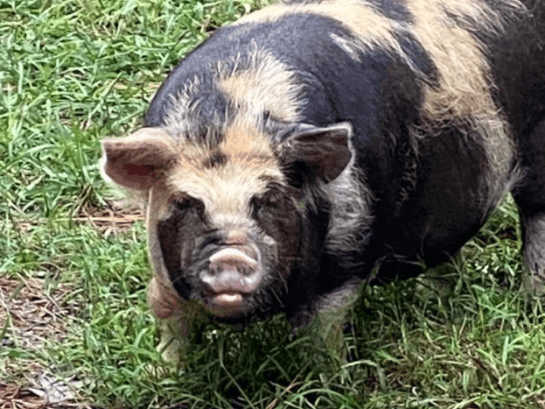
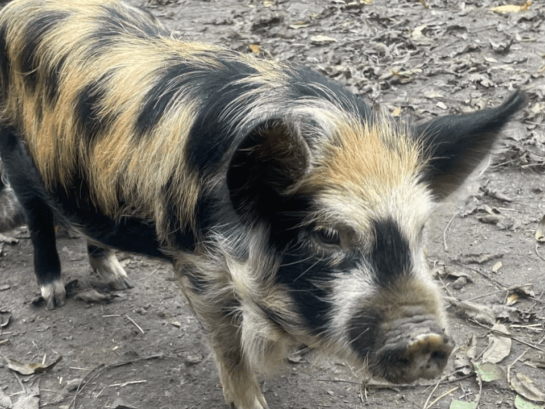
Summary
the decision to buy a registered or unregistered KuneKune pig ultimately depends on the preferences and goals of the potential buyer. Registered pigs offer the benefits of breed purity, documented lineage, and potential for showing and competition. Unregistered pigs may be a more economical option for those seeking a pet or small-scale pig. By carefully considering these factors, potential buyers can make an informed decision that aligns with their specific needs and goals.
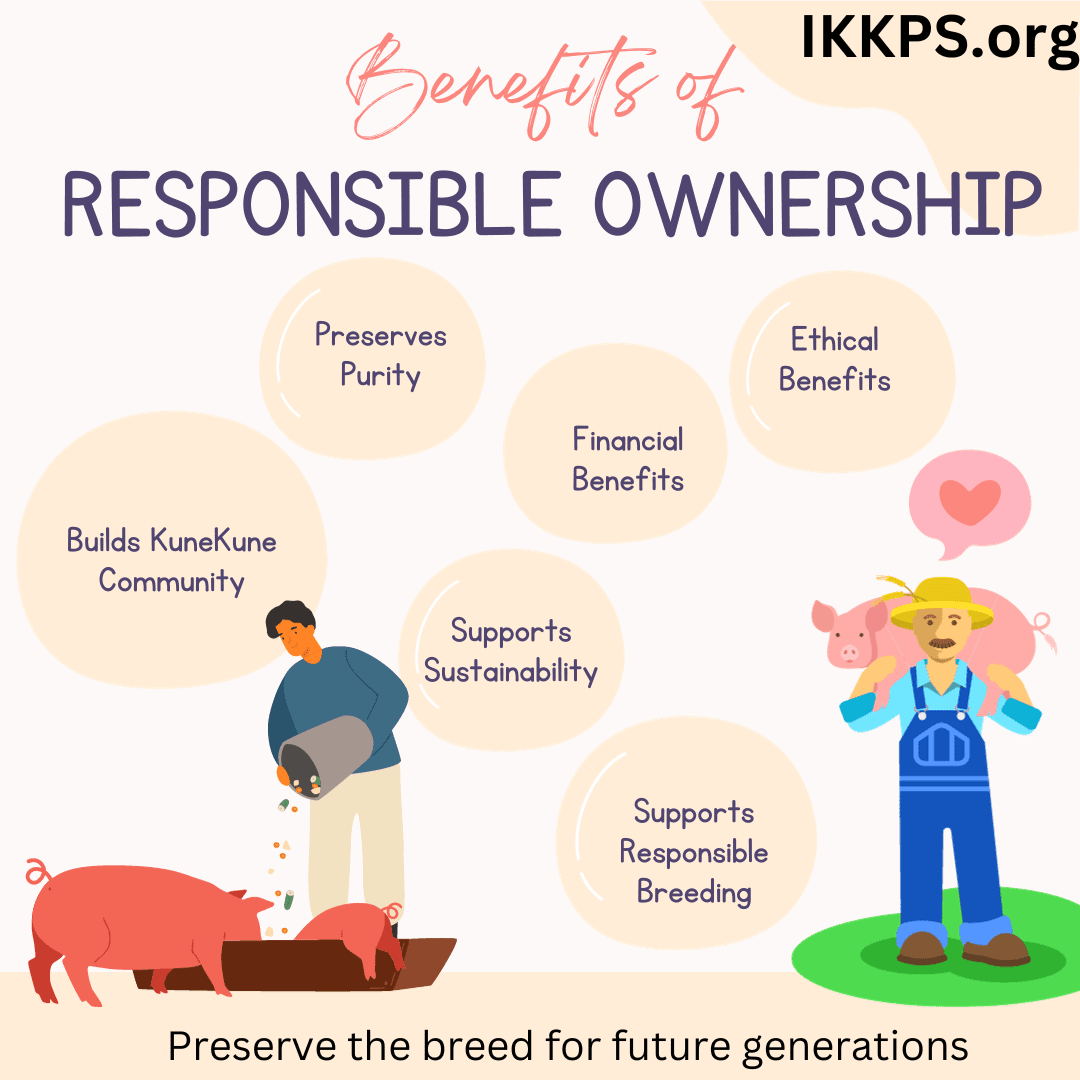
Why Registering Your Kunekune Pig is More Than Just a Piece of Paper
A Call for Responsible Ownership and Breed Preservation
The Kunekune pig, with its floppy ears, mud-caked smile, and gentle nature, has captured the hearts of many. But for those fortunate enough to call themselves Kunekune owners, a crucial decision awaits register your pig or not. While some may consider it an unnecessary hassle, registering your Kunekune isn't just a
bureaucratic formality; it's a vital step towards responsible ownership and safeguarding the future of this unique breed.
Preserving Purity and Pedigree
KuneKunes, a breed of pig, have had a hard time in the past and were close to extinction. However, thanks to the efforts of dedicated breeders and enthusiasts, their
population is now growing steadily. To maintain the breed's unique characteristics and genetic purity, it is important to manage them carefully.
Registering your Kunekune is important because it serves as an official record that helps breeders maintain accurate pedigrees and ensures that the pig is of pure
Kunekune lineage through a long history of DNA parentage verification. This lineage information is vital for responsible breeding practices and future conservation efforts.
Unlocking Ethical and Financial Benefits
Kunekune pigs that are registered usually have a higher value when selling their piglets or breeding stock. This is due to their documented lineage and genetic purity.
Moreover, some livestock insurance companies provide lower rates for registered animals, as they recognize their pedigree and potential value.
Supporting Responsible Breeders and Sustainability
Registering your Kunekune pigs with a reputable Kunekune Registry is a clear indication of your commitment to ethical breeding practices and sustainable farm management. These registries have strict guidelines for animal welfare, husbandry, and breeding standards, ensuring that you support breeders who prioritize these
values. By doing so, you also contribute to the sustainable future of the breed.
Beyond Paperwork: Building a Community
When you register your Kunekune, you become a part of a worldwide network of breeders, enthusiasts, and experts who share your passion for this unique breed. By joining certain breed registries, you can access valuable resources, educational workshops, and events where you can exchange knowledge, share experiences, and build a supportive community centered around your love for Kunekunes.
Now remember that not all KuneKune registries are created equal. With IKKPS, we specialize in building a community by offering continued learning virtual meetings each month. In these meetings, members are not muted, and interactions are encouraged. While there is a topic each month, there is more sharing and collaboration between the members. You can meet and discuss challenges and learn what other breeders do that you may wish to incorporate into your breeding program all while in a fun, relaxed environment.
The Responsibility of Ownership
Owning a Kunekune pig is not just a pleasure, it is a privilege. By registering your pig, you are showing your commitment to being a responsible steward and preserving the breed's history, genetic diversity, and contributions to sustainable agriculture. Registering your pig is an important way to acknowledge your role in safeguarding this charming and resilient animal for future generations.
So, next time you gaze into your KuneKune’s mud-caked face and rub their floppy ears, remember that registering them is more than just a piece of paper. It is a promise to the future of the breed, an act of responsible ownership, and a celebration of the unique bond between humans and these remarkable creatures.
Take the next step:
Join the KuneKune registry and commit not only to your KuneKunes but, to the longevity of the KuneKune breed. Together, let's ensure the future of these beloved pigs and leave a lasting legacy of responsible ownership for generations to come.
The Importance of Registrations
by Kathy Petersen
Registering your pigs is a crucial step to take in preserving the KuneKune breed in the USA. As the number of unregistered pigs being sold online continues to rise, it is essential to recognize the significance of registration in maintaining the integrity of the breed. While IKKPS respects breeders' autonomy in their breeding programs, registering your pigs is a vital responsibility for all breeders, owners, and enthusiasts to uphold the breed's standards and ensure its future sustainability.
Some Background
In New Zealand, John Simister and Michael Willis had a hard time finding 18 pigs with the right characteristics of the KuneKune breed. There was no registry to track the breed at that time, and they found that Kunes was almost extinct. They started tracking pedigrees and registering the breed to help with its recovery. They and other breeders registered their offspring for many generations. This continued for many years.
Where Things Began to Go Wrong
Where things get fuzzy in the heritage of this breed, is when breeders did not register their offspring and they were sold unregistered. Later, the society in New Zealand began to see a trend in unregistered stock. They chose to accept unregistered pigs into the herd books in hopes of trying to get the unregistered stock back to registered ones.
Sending a knowledgeable person to look at the pig and register the pig as KuneKune based on the visual characteristics of the individual pig. Allowing unregistered pigs into the herd book without registration as inspected began a normal practice. The degradation of their herd book may in part have led to KuneKunes in New Zealand being given away or sold for less than even the market value of farm pigs. (We can only assume at this point)
How We Can Do Things Differently
It is crucial to maintain a precise and up-to-date registry of KuneKunes in the United States to safeguard the breed's purity and prevent the mistakes that have been made in other countries. This can be accomplished by exclusively using registered animals for breeding, refraining from crossbreeding, and registering all intact pigs that leave our farm, regardless of whether they are intended for breeding or simply for grazing. By maintaining a thorough record of all KuneKunes, we can effectively monitor and preserve the breed's population and genetic diversity.
Cost of Registering
Registration with IKKPS is easy and affordable. All breeders can access the IKKPS registration forms and actions online through their website for added convenience. There are two membership levels, both of which offer free registrations for all members. To ensure the future of the KuneKune breed for all breeders and future generations, you only need to invest $38 in DNA testing for each piglet that is suited for breeding, or just the cost of permanent identification for those that are better suited as grazing pigs.
IKKPS also allows non-members to register their pigs. However, the cost of registration is slightly higher for non-members. As our primary goal is to preserve the breed, we are the only registry that does not require membership for breed preservation.
It appears to be a straightforward question for me. Whenever I gaze upon those endearing little faces, I am filled with the desire to ensure their longevity so that future generations, including my grandchildren's children, can continue to delight in them.
Additional Resources to consider.
Registry Office
17500 Hamilton Arms Court Dewitt, VA 23840